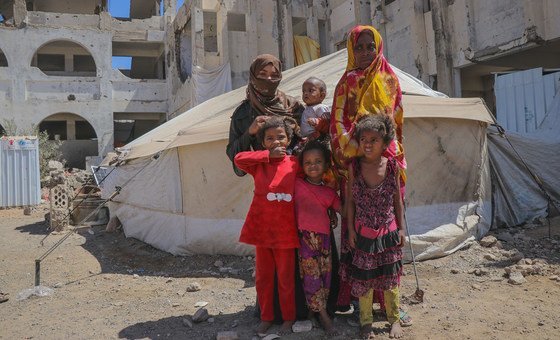“It was the morning of a normal working day before fighting escalated close to the hospital. I heard a mother screaming at the gate”, midwife Shrook Khalid Saeed told UNFPA, at the Al Shaab Hospital in the district of Crater, in Yemen.
By the time she arrived at the entrance to the hospital, hostilities in the area had flared and a gunfight had broken out. “Bullets were coming from all the corners of the street”, she recounted. “When I arrived at the gate, I found the pregnant woman lying down and crying for help. I pulled her and rushed her inside a car. That is where all of it happened. In a few minutes, she had delivered a healthy baby boy.”
Childbirth can be harrowing in even the best of times but the cascade of humanitarian crises in Yemen have made the journey to motherhood more dangerous than ever. The country’s long-running conflict has depleted the health system. Currently only half of all health facilities are functioning.
The pandemic has only aggravated the situation, with roughly 15 per cent of the health system shifted to deal with COVID-19 cases. Only 20 per cent of functioning health facilities are providing maternal and child health services.
Today, a woman in Yemen dies during childbirth every two hours, almost always from preventable causes. And now, the threat of famine looms.
“The situation is catastrophic,” said UNFPA Executive Director Dr. Natalia Kanem, during her recent three-day visit to the country.

The UNFPA Executive Director Dr. Natalia Kanem (left) talks to a patient at the Al Shaab Hospital in Crater, in Yemen.
In place of joy, fear looms
Pregnant and breastfeeding women are especially vulnerable during times of food insecurity. Currently 1.2 million pregnant and breastfeeding women are acutely malnourished, and these numbers could double if humanitarian funding does not materialize.
“When I came to receive antenatal care at Al Shaab Hospital, I was very weak and pale. I could not stand straight”, 33-year-old Hafsa told UNFPA during Dr. Kanem’s visit. “My nutritional status was very poor. I was given medicines to supplement my diet, and I was advised to eat meat, vegetables and fruits.”
But good nutrition was beyond reach due to her family’s low income. When she delivered her daughter months later, the girl weighed only 1.8 kg. “The baby stayed in the hospital for a couple of days as I did not have enough breast milk to feed her”, Hafsa said.
Malnutrition puts both women in childbirth and newborn babies at serious risk.
“I’ve been in many maternity wards, and they are usually a place of joy. But in Yemen, I witnessed the devastation of malnutrition and hunger, with newborn babies on feeding tubes and mothers weakened by fear and exhaustion,” Dr. Kanem noted. “It is heartbreaking to see fellow members of the human family in such dire conditions.”
Violence at home
Women’s and girls’ vulnerability to violence has greatly escalated under the country’s crisis.
During Dr. Kanem’s visit, she spoke to women at a UNFPA-supported shelter.
One young girl, Alea*, told Dr. Kanem about being married off at age 13. Child marriage is increasingly being used as a coping mechanism by impoverished families.
“When I told my father, I do not want to get married, my father and grandmother beat me with a water pipe. They said by getting married I will have a better life”, Alea said. “My life only got worse. My husband started to sell all my jewellery and when I inquired about them, he would beat me. I then ran to my father’s house, but he also beat me and chased me back to my husband. I was left with nowhere to go.”

A nine-month-old girls is checked for malnutrition at a health centre in Sana’a, Yemen.
Escape to shelter
A neighbour helped Alea escape. She has been living at the shelter for over five months, attending training workshops and dreaming of returning to school.
“I spoke to young girls and pregnant women who had to flee for their lives and seek protection at UNFPA sites, which are among the very few safe spaces for women and girls”, Dr. Kanem said.
UNFPA is supporting eight such shelters and 51 women’s and girls’ safe spaces. Last year, UNFPA provided more than half of all health facilities in Yemen with essential life-saving medicines and reached more than 1.2 million women and girls with reproductive health services.
But much more support is needed. “The women and girls of Yemen deserve peace. For too long, they have been caught up in a conflict that is not of their making,” Dr. Kanem urged. “The world must act now.”
* Name changed for protection and privacy

